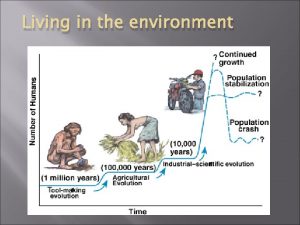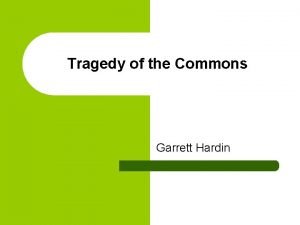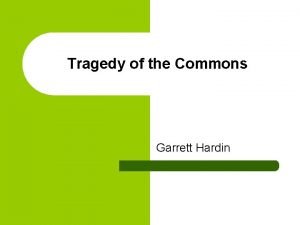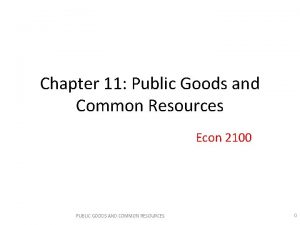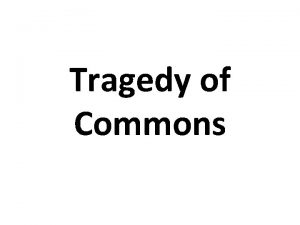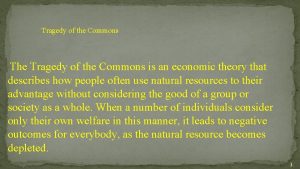Commons What is the tragedy of the commons








- Slides: 8

Commons

• What is the tragedy of the commons? – https: //www. youtube. com/watch? v=Cx. C 161 Gv. MPc • Hardin: tragedy of the commons – The “tragedy of the commons” is a central concept in human ecology and the study of the environment. The prototypical scenario is simple. There is a resource—usually referred to as a common-pool resource—to which a large number of people have access. The resource might be an oceanic ecosystem from which fish are harvested, the global atmosphere into which greenhouse gases are released, or a forest from which timber is harvested. Overuse of the resource creates problems, often destroying its sustainability. The fish population may collapse, climate change may ensue, or the forest might cease regrowing enough trees to replace those cut. Each user faces a decision about how much of the resource to use—how many fish to catch, how much greenhouse gases to emit, or how many trees to cut. If all users restrain themselves, then the resource can be sustained. But there is a dilemma. If you limit your use of the resources and your neighbors do not, then the resource still collapses and you have lost the short-term benefits of taking your share (Hardin, 1968).

• Commons: Common-pool resources (CPRs) are natural or human-made resources where one person's use subtracts from another's use and where it is often necessary, but difficult and costly, to exclude other users outside the group from using the resource • Different from public goods: you can not subtract, you can not exclude others • Different from private goods: you can subtract, you can exclude others

• According to Hardin, the tragedy of the commons was unavoidable if nothing is done to correct it. • See ten examples of the To. C: – https: //www. dummies. com/education/science/e nvironmental-science/ten-real-life-examples-ofthe-tragedy-of-the-commons/

• Hardin prescribed a strong intervention on the part of the state. Command control measures to protect natural resources • Later, privatization was proposed to solve the tragedy of the commons • discuss: what are the reason to suggest privatization as a way out to the To. C?

A third approach: self-organisation/comanagement • Beyond the tragedy of the commons – https: //www. youtube. com/watch? v=By. XM 47 Ri 1 Kc Elinor Ostrom spent her academic life to demonstrate that the tragedy of the commons is not destiny. Empirically it is possible to identify hundreds of cases that show that local people managed to self-rule and self-organise to make sustainable use of natural resources possible Research: https: //dlc. dlib. indiana. edu/dlc/contentguidelines#agriculture

Ostrom: 8 rules • • 1. Commons need to have clearly defined boundaries. In particular, who is entitled to access to what? Unless there’s a specified community of benefit, it becomes a free for all, and that’s not how commons work. 2. Rules should fit local circumstances. There is no one-size-fits-all approach to common resource management. Rules should be dictated by local people and local ecological needs. 3. Participatory decision-making is vital. There all kinds of ways to make it happen, but people will be more likely to follow the rules if they had a hand in writing them. Involve as many people as possible in decision-making. 4. Commons must be monitored. Once rules have been set, communities need a way of checking that people are keeping them. Commons don’t run on good will, but on accountability.

• 5. Sanctions for those who abuse the commons should be graduated. Ostrom observed that the commons that worked best didn’t just ban people who broke the rules. That tended to create resentment. Instead, they had systems of warnings and fines, as well as informal reputational consequences in the community. • 6. Conflict resolution should be easily accessible. When issues come up, resolving them should be informal, cheap and straightforward. That means that anyone can take their problems for mediation, and nobody is shut out. Problems are solved rather than ignoring them because nobody wants to pay legal fees. • 7. Commons need the right to organise. Your commons rules won’t count for anything if a higher local authority doesn’t recognise them as legitimate. • 8. Commons work best when nested within larger networks. Some things can be managed locally, but some might need wider regional cooperation – for example an irrigation network might depend on a river that others also draw on upstream
